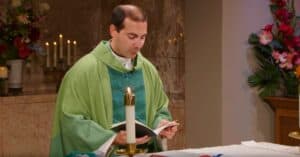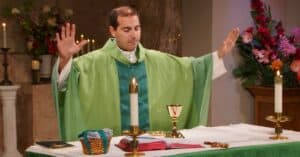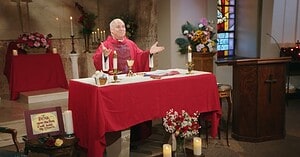Nativity of the Lord
Homily Video
Nativity of the Lord Homily Transcript
A blessed Christmas to you all.
It’s a privilege to be here at Mercy Home to celebrate this Eucharist, for all of those who are viewing it, and on behalf of the good works that are being done here- which deserve our support.
One of the earliest memories I have as a youngster occurred this time of the year. It was a Saturday evening, someone knocked at the door, and it was a parishioner collecting funds for a family that had just lost their father. He was in his forties and had a heart attack and died, leaving behind six children. My mother went for her purse and took out five dollars and gave it to the man and then she said to us as he walked off, “Well, that’s the last money we have until dad gets paid on Monday.”
That story always stuck with me, but came to mind as I thought about how I can speak about celebrating Christmas in this time of the year when we are stricken by this pandemic, by this coronavirus and sheltered in our own places. Quarantined off from one another and we find how vulnerable our lives all are.
But also, to reflect on it in view of what we hear in this gospel about these shepherds because they are the first ones to accept the invitation to greet the new born king. And therefore, set a pattern for us. They say something to us.
The shepherds, as we hear, are on the hillsides- they’re living on the margins of society, they’re somewhat rejected. They’re almost looked upon as some criminal group of peoples sometimes by those who are living in the city. They in some way are very much reflective of how Mary and Joseph also are living at the edges of society. There’s no room at the inn for them.
That story of my mother giving a gift to the person, to the family that was suffering really reminded me of how it is so often on the edges of our existence that we come face to face with reality. How all of our lives so often are, can become numb at times by the routine we have of ignoring those who are on the margins. Until we are faced, come face to face with the edginess of our lives and the vulnerability and mortality that we feel at this time. So that we should look upon these days as a real gift that the Lord has given to us, so we come face to face with the real lives of so many people.
We have an opportunity to see what God is doing in these moments in which people are just living day to day with not only the virus of this covid-19, but the virus of disinterest. The virus of ignoring, being ignored. The virus of indifference, as the Holy Father calls it.
I think it’s very important for us always to approach these moments in which we are living on the edge, as an opportunity not to be afraid of it but come face to face with it. Much like my mother did in giving that five dollars. Much like it’s done here at Mercy Home. Where young people who need assistance have all sorts of difficulties and challenges before them and yet the work that’s being done here is seeing what’s real in life. Going to the edges as the shepherds go to the inn, to that place where in the stable where the child Jesus is. Not to be afraid of the edges, but to see it as an opportunity where God is working.
The second thing that we see about these shepherds is that as they come there they can identify with where Jesus is, being in a stable because they also are living with the sheep. They’re living with animals and livestock.
The Holy Father keeps telling the church that we need to have the smell of the sheep on us. That story comes in a moment in which he was the superior of the Jesuits in Argentina. And there was a seminarian there who was, he wanted to make sure he understood what ministry was about. And they ran a farm and a mother sheep rejected this ewe that was born. And, so ah, he told the seminarian that he had to take this young lamb to his room and care for it and feed it with a bottle. And after a while, they knew that this seminarian was coming into the room because they could smell him a mile away. He smelled like the sheep.
And so, this is what the shepherds are telling us too. That we need not only to recognize those who are in our midst, who have difficulty but to be so close to them that we don’t mind- if we take the risk of being associated with them. Not only their odors and their smells, but also understanding them to the point where we’re walking with them. The shepherds are reminding us to accompany people, to walk with them.
And finally, what the shepherds do is they go to Bethlehem and they tell their story. And what’s interesting, in now for all eternity -since the earliest days, when this story was told- the birth of Christ is always going to be associated with their story. It is an invitation for us to begin to look at our lives as part of the story of God’s redeeming work. To see that we have a part to play in it and to have the ability to dream about our lives is much bigger than just what we accomplish on our own, but how we are a part of what God is doing each and every day. That our lives, in some way, are linked to those who are in need because God is present there in that moment.
And here I am today, some six decades later telling you, sharing with you a story from my childhood. In a way, that is a reminder that it’s important for us to look at how over the span of our lives, God has continually called us to appreciate how He is present in the world. And calling us to the kinds of discipleship that we should have.
And so, as we celebrate Christmas this year, as we are brought to the edges we’re reminded by these shepherds not to be afraid of coming face to face with the reality of life. The reality that other people feel. Not to become indifferent. But also, like them to go in haste to accompany those who are in need. And to be willing to support the good works such as Mercy Home and all those who are accompanying people day after day in their difficulties.
But also, to reimagine our lives as part of the story of Christmas. Just like the shepherds are part of the story of Christmas, so should our lives be as well. And maybe to live our lives in such a way that we would dream about the fact that our children and grandchildren of this generation will one day look back on the way that we handled this coronavirus, this moment in which we were not afraid to confront the edginess of life and accompany people. And like those shepherds, celebrate their Christmas with a sense of wonder and awe at how God has done such great things. And be inspired to live their lives as part of the story of Christmas, like we have.
Discover More
Fifteenth Sunday in Ordinary Time
July 13, 2025
Fourteenth Sunday in Ordinary Time
July 6, 2025
Saints Peter and Paul, Apostles
June 29, 2025
Request Sunday Mass Guide
The Sunday Mass Guide sent to your home address
Spiritual nourishment and updates from the Sunday Mass community
Monthly reflections from Fr. Scott Donahue, our Principal Celebrant


